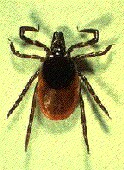- The Best Time of Day to Drink Bone Broth to Maximize Health Benefits
- 8 Ways to Increase Dopamine Naturally
- 7 Best Breads for Maintaining Stable Blood Sugar
- Gelatin vs. Collagen: Which is Best for Skin, Nails, and Joints?
- The Long-Term Effects of Daily Turmeric Supplements on Liver Health
- Could Your Grocery Store Meat Be Causing Recurring UTIs?
- Are You Making This Expensive Thermostat Error This Winter?
- Recognizing the Signs of Hypothyroidism
- 10 Strategies to Overcome Insomnia
- Could Artificial Sweeteners Be Aging the Brain Faster?
Prevent Tick Bites While Enjoying the Outdoors


With spring’s arrival, many Americans will begin enjoying outdoor activities such as hiking, camping and gardening — and they need to protect themselves from tick bites, an expert says.
“There aren’t any vaccines for tick-borne diseases like Lyme, Rocky Mountain spotted fever, ehrlichiosis and anaplasmosis, so the only way to prevent infection is to not get bitten in the first place,” Dr. Christopher Ohl, a professor of infectious diseases at Wake Forest Baptist Medical Center, said in a Wake Forest news release.
Ohl, who is also the medical director of communicable diseases for the Forsyth County, N.C. Health Department, offered the following tips:
- Use an insect repellant containing DEET on exposed skin, and treat clothing and footwear with a permethrin-based repellant that provides weeks of protection and remains through several washings.
- Tuck your pants into socks to reduce the amount of exposed skin. When hiking, stay on well-worn paths and out of tall grass or bushy areas.
- Check for ticks immediately after being outdoors. The longer a tick is attached, the greater your risk of infection.
- If you discover a tick, use tweezers to remove it as close to the skin as possible. Don’t grab it with your fingers and squeeze it. That injects the tick fluids into you and increases the risk of infection, Ohl warned.
- If you suffer a tick bite and develop a fever one to two weeks later, see a doctor. The incubation period for tick-borne diseases is eight to 14 days, he said.
- Protect your dog with tick collars or monthly treatments. This will prevent ticks from being brought into your home by the dog.
More information
Visit the U.S. Centers for Disease Control and Prevention to learn more about tick bite prevention.
Source: HealthDay
Copyright © 2026 HealthDay. All rights reserved.










